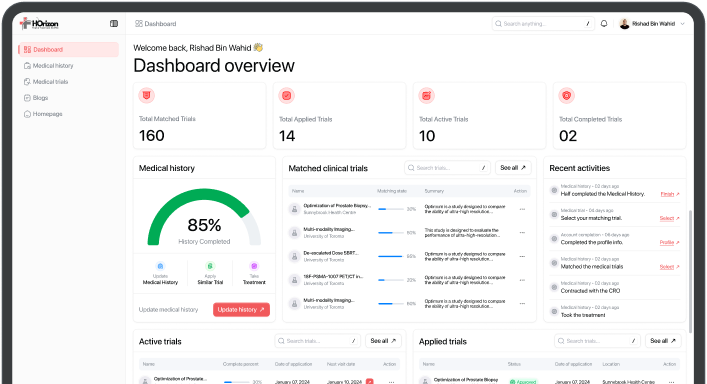Clinical trials are pivotal in advancing medical knowledge and developing new treatments. Yet, clinical trial Misconceptions might discourage potential participants. Let’s debunk these myths to foster a better understanding of the crucial role clinical trials play.
Myth 1: I’ll be treated like a guinea pig
Reality:
The fear of being treated like a guinea pig is a common concern about participating in clinical trials. However, this misconception is far from the truth. In clinical trials, participants are treated with the utmost care and respect. Before joining a trial, individuals go through a detailed informed consent process. This process ensures that participants fully understand what the study involves, including any potential risks and benefits.
The informed consent process is designed to empower participants, providing them with all the information they need to make an informed decision about whether to join the trial. Researchers are obligated to be transparent about the study’s procedures, goals, and the potential impact on participants. They must address any questions or concerns individuals may have before they decide to participate.
Moreover, participants in clinical trials have the freedom to leave the trial at any time and for any reason. The ethical principle of voluntary participation is a cornerstone of clinical research. Individuals are never obligated to stay in a study if they wish to withdraw.
In essence, being part of a clinical trial does not equate to being a mere subject of experimentation. Participants are partners in the research process, contributing to the advancement of medical knowledge while receiving careful attention to their well-being. The myth of being treated like a guinea pig is dispelled by the ethical guidelines and procedures in place to ensure the safety and dignity of all clinical trial participants.
Myth 2: Clinical trials use untested drugs
Reality:
Another common misconception about clinical trials is the belief that they involve untested and potentially unsafe drugs. In reality, before any new treatment reaches the clinical trial stage, it undergoes rigorous testing in laboratories and on animals to ensure its safety.
Clinical trials, especially in their early phases (Phase 1), focus primarily on assessing the safety of a potential therapy. Phase 1 trials typically involve a small group of healthy volunteers, and the main goal is to determine a safe dosage range and identify any side effects. Only when a treatment demonstrates safety in these initial stages does it progress to further testing.
The clinical trial process consists of distinct phases, each serving a specific purpose. In Phase 2, the focus shifts to both safety and effectiveness, involving a larger group of participants. Phase 3 trials, which enroll thousands of participants, provide more comprehensive data on effectiveness, safety, and potential side effects.
Furthermore, participants in clinical trials are informed about the phase of the trial and any potential risks associated with the investigational treatment during the informed consent process. This transparency allows individuals to make informed decisions about their participation.
It’s crucial to understand that clinical trials adhere to strict ethical and safety standards. The misconception that clinical trials use untested drugs overlooks the extensive pre-trial testing and the careful progression of treatments through well-defined research phases. Clinical researchers are dedicated to ensuring the safety of participants and the validity of the scientific findings.
Myth 3: Once I join, I can’t change my mind
Reality:
A prevalent misconception about clinical trials is the belief that once you join, you’re locked in and cannot change your mind. In reality, participants have the freedom to withdraw from a clinical trial at any time and for any reason.
Clinical trial participation is a voluntary commitment, and individuals are never obligated to continue if they decide it’s not the right choice for them. The informed consent process, a crucial aspect of clinical trials, ensures that participants are fully aware of what the study involves, including potential risks and benefits.
The informed consent process is not a one-time event; it’s an ongoing dialogue between participants and the research team. Participants receive regular updates and information about the trial’s progress, and they have the right to ask questions and seek clarification at any stage.
If, at any point, a participant decides to withdraw from the trial, they are encouraged to communicate this decision to the research team. Withdrawing from a trial does not affect a participant’s regular medical care or relationship with their healthcare provider.
This flexibility is integral to the ethical conduct of clinical trials, respecting the autonomy and choices of participants. It ensures that individuals can actively engage in the decision-making process throughout the study, fostering a sense of control and transparency. It’s essential for potential participants to understand that joining a clinical trial is a voluntary commitment, and they retain the right to change their mind at any time.
Myth 4: I might get a placebo, and it won’t help me
Reality:
Concerns about receiving a placebo rather than an active treatment often deter individuals from participating in clinical trials. However, it’s crucial to understand that while some clinical trials involve placebos, they are not used in every study.
In clinical trials comparing a new treatment to an existing one, participants are often randomized into groups. One group receives the new treatment, while the other receives the standard or existing treatment. This design allows researchers to assess the effectiveness of the new intervention.
If a placebo is used, participants are informed about it during the informed consent process. Importantly, placebos are typically reserved for studies where there’s no existing standard treatment for the condition under investigation. In many cases, especially for serious or life-threatening conditions, trials compare the new treatment to the best available standard care.
Moreover, even if a trial involves a placebo, participants are closely monitored throughout. If the new treatment shows efficacy during the study, there are usually provisions to offer it to participants after the trial. This ensures that individuals receive beneficial treatments, and ethical guidelines mandate that participants’ well-being is prioritized.
Understanding the design of the trial and the potential use of placebos is a key aspect of the informed consent process. It empowers participants to make informed decisions about their involvement, dispelling misconceptions and fostering trust in the clinical research process.
Myth 5: Clinical trials only help in the future, not today
Reality:
It’s a common misconception that participating in a clinical trial is solely a future-oriented contribution to medical science. However, the reality is that clinical trial participation can provide immediate benefits to participants.
While it’s true that the full process of clinical research, from trial initiation to treatment approval, can take several years, participants often gain more than just the satisfaction of advancing medical knowledge. Throughout the trial, individuals receive careful medical attention and monitoring, sometimes surpassing the level of care available through conventional treatments.
Clinical trial participants have access to cutting-edge treatments before they are widely available. This can be especially significant for individuals with conditions that don’t respond well to standard treatments or for those who have exhausted available therapeutic options.
Moreover, participating in a clinical trial means being actively involved in one’s healthcare journey. Participants receive regular check-ups, often from leading medical experts, and contribute valuable data that can shape the development of new and improved therapies. This personalized care and engagement can enhance the overall quality of life for participants.
It’s essential for individuals considering clinical trial participation to recognize that they are not merely helping future generations; they are taking an active role in their own health, potentially gaining access to groundbreaking treatments, and contributing to advancements that can benefit patients today and in the future.
Myth 6: Being in a trial is expensive and not covered by insurance
Reality:
A prevalent misconception is that participating in a clinical trial comes with financial burdens and that associated costs are not covered by insurance. However, in reality, the majority of clinical trial participants rarely have to bear the costs related to their involvement.
Clinical trials typically have sponsors—often pharmaceutical or biotech companies or research organizations—that cover the expenses associated with the trial. This includes the costs of the investigational treatment, medical tests, and procedures required during the study. In other words, participants are not responsible for the financial aspects directly tied to their involvement in the trial.
Moreover, routine medical care and tests that would be part of standard treatment are often covered by participants’ health insurance. This means that usual medical expenses incurred during the trial, unrelated to the investigational treatment, are handled through regular insurance channels.
Before enrolling in a clinical trial, participants should discuss the financial aspects with the research team and their health insurance provider. This ensures a clear understanding of what costs, if any, might be the participant’s responsibility and what aspects are covered by the trial sponsor and insurance. Understanding the financial aspects is crucial for making informed decisions about trial participation and alleviates the misconception that it comes with a financial burden.
Myth 7: I don’t have time for a clinical trial
Reality:
It’s a common misconception that participating in a clinical trial is a time-consuming commitment that many people can’t afford. However, the time requirements for clinical trials can vary significantly.
Some trials might only involve a few visits over an extended period, while others might necessitate more frequent visits. To accommodate participants with busy schedules, some trials offer flexible options such as virtual check-ins or visits outside regular working hours.
Before enrolling in a trial, participants receive detailed information about the trial schedule, the frequency of visits, and any potential virtual options. This allows individuals to make an informed decision based on their time availability. In some cases, trials may even provide transportation services or compensate for travel expenses, further addressing the time-related concerns.
Understanding the time commitment required for a specific trial is crucial for potential participants. This ensures that individuals can make decisions aligned with their schedules, dispelling the myth that clinical trials demand an impractical amount of time.
Myth 8: You need to live near a major hospital
Reality:
Another misconception is that only those living in proximity to major hospitals can participate in clinical trials. While major hospitals and academic research facilities do conduct trials, many trials are also run by regional hospitals and smaller clinics.
To address geographical barriers, some trials offer compensation for participants who need to travel from farther distances, especially for those involved in rare disease clinical trials. Moreover, the rise of virtual elements in clinical research allows participants to engage partially or fully remotely, making it more accessible to individuals regardless of their location.
This myth highlights the importance of dispelling the notion that clinical trials are exclusively for those in close proximity to major medical centers, emphasizing the inclusivity of trials across diverse locations and communities.
Myth 9: Clinical trials are only a last resort
Reality:
Contrary to the belief that clinical trials are a last resort, there are trials available for patients at various stages of their diagnosis. While some trials cater to patients who have exhausted other treatment options, others seek participants who are newly diagnosed or have specific symptoms.
Clinical trials play a crucial role in the entire spectrum of healthcare, offering diverse options for individuals throughout their medical journey. Understanding that trials are not solely for those with no other options encourages patients to explore these opportunities as part of their overall healthcare plan. The misconception of trials being a last resort can limit awareness and access to potentially beneficial treatments at different stages of illness.
Understanding these realities empowers individuals to make informed decisions about participating in clinical trials. These studies are not just about the future; they actively contribute to personalized care and the progress of medical science. Participating in a clinical trial is a valuable opportunity for both individuals and the broader community.

